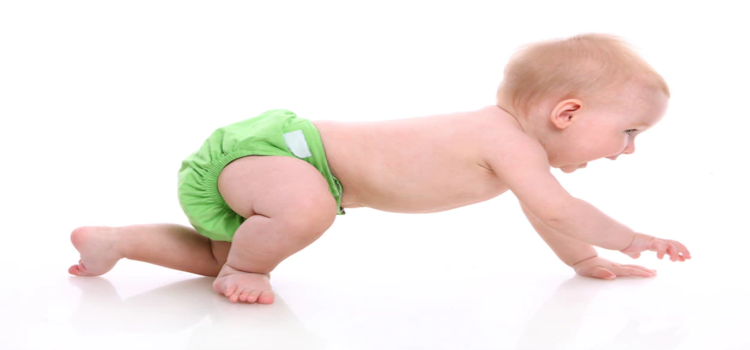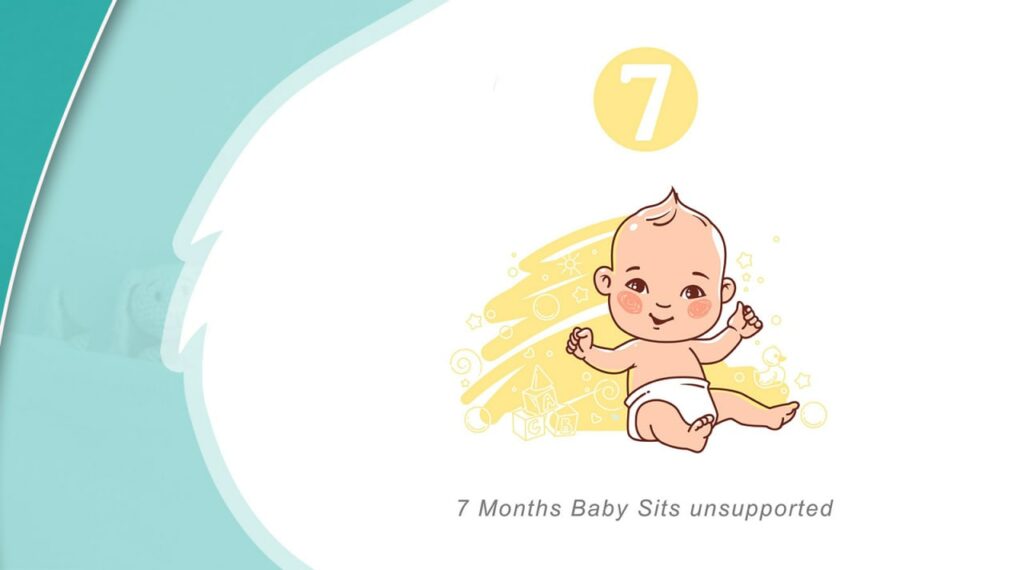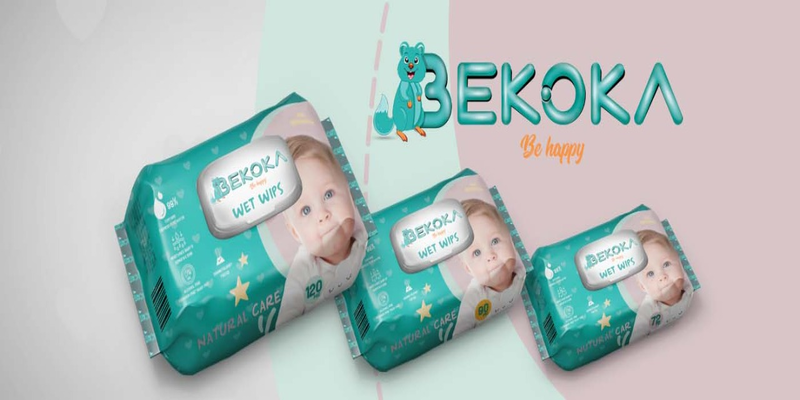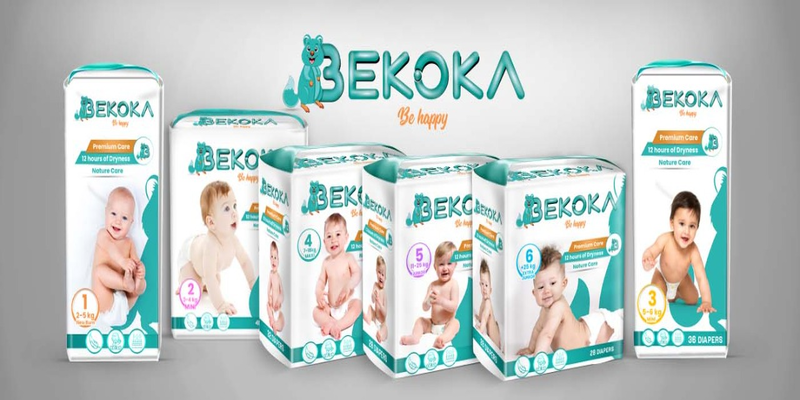Whoever was on the lap yesterday is now seven months. Seven-month-old baby becomes more mobile and active than before. Your baby is now stronger and smarter, and you must have a lot of questions and concerns around this age. It may come to your mind how much the baby sees in the seventh month. What foods does the child eat in the seventh month? Should you worry if your baby’s teeth haven’t appeared yet? In this article, we will answer your questions.
Your baby is growing and is between 65 and 74 cm in length while his weight ranges from 7 to 10.2 kg. The above data are just averages and height and weight vary widely among babies. Remember, that as long as your baby is growing at a steady upward rate on the chart at the doctor’s, your baby’s development has no problems.
Seven-month-old baby has learned to move and roll from the tummy to the back and then back on the tummy. Some babies are also able to move from the tummy to a sitting or standing position holding onto a person or object.
In order to stimulate your seven-month-old baby’s potential energy and encourage him to move, it is important to choose toys that stimulate him, such as toys that have wheels that your baby can push while crawling, or balls that your baby can roll, and toys that make musical sounds like walkers and toys Rockers.
seven-month-old baby is able to sit up without any help, but he may have to keep his hands on the floor to stabilize himself. If your baby hasn’t started crawling yet, be ready. At this stage, babies may develop early movements while others may be late so there is no need to worry as your baby may walk without crawling. Dear mother, babies have several ways to crawl, some of them start crawling backward or sideways, and there are those who crawl on one knee or on their back, but most babies crawl on their hands and feet.
It’s amazing to watch your baby hold things tightly with a strong fist, but you will be amazed when you see him grab things like small toys with two fingers.
The most important characteristic of a seven-month-old baby’s development is the expansion of his social interaction. He enjoys interacting with others – especially members of his family – and loves laughter and incomprehensible gossip. You will find yourself laughing and playing with him and your life has changed too. Also, when you call your baby or a family member calls him, he is distracted because he knows his name.
Seven-month-old baby’s hand-eye coordination improves, so you may see him stare at his hands — especially if he’s holding a toy. Often times your baby stares at his hands for an extended period of time as he thinks about what his hands can do and how they work. You may also notice that he is staring at a toy and then slowly reaching out to pick it up and examine it. The cool thing here is that he can clap.

Seven-month-old baby food
Breastfeeding and formula feeding are still important for your baby, from 4 to 6 feedings per day. Besides, you should offer your baby different types of food because it is better for your little one’s health.
A great option for feeding your baby is boiled and mashed pumpkin, as well as sweet potatoes. You may be wondering why these particular categories. These attractively colored vegetables are full of vitality and flavor. They also contain a good amount of Vitamin A, which enhances your baby’s eyesight and strengthens his immunity.
Mother should offer her baby foods that he initially rejected, with the passage of time he will become accustomed to different types of food. But if your baby continues to refuse a type of food, skip it because there is no point in forcing the baby to eat something he does not like. It frustrates both of you and makes meal times stressful rather than enjoyable.
Don’t neglect to drink your baby water, and as we mentioned in the article on the development of the baby in the sixth month, the baby begins to drink water when he is 6 months old. Don’t worry if your baby drinks water in small quantities, but continue to offer him water in a special cup during meals and encourage him to drink water.
Does a seven-month-old baby eat eggs?
Do most parents wonder about the risks of eating eggs and does it cause allergies?
Pediatricians used to tell parents to wait up to 9 months to introduce egg yolks to the baby’s food, and to wait up to 12 months to feed the baby egg whites. But the latest food allergy research suggests that it may actually benefit a child to introduce allergenic foods early. So the short answer is yes, you can feed your baby eggs from the age of at least 6 months, after consulting your pediatrician.
If the pediatrician is against offering your baby eggs, there are still plenty of delicious and nutritious options for your seven-month-old baby to try. You can also add natural juice mixtures such as banana, apple, peach, or mashed berries. Yogurt is also beneficial and healthy for your baby.
Seven-month-old baby sleeps
Your baby’s sleep at this age is more regular and has a more predictable sleep schedule than in the first months. The average baby sleeps at this age from 14 to 15 hours a day, including 11 hours at night and nearly 4 hours during daytime naps.
It is important to know that the number of hours is not fixed because there are things that disturb your baby’s sleep at this age, such as teething, the beginnings of separation anxiety from his parents, and his longing to wake up for more play, excitement, and suspense.
But if your baby sleeps intermittently and wakes up a lot at night, you should help him by making sure that he is full and his diaper is clean. A good idea is to shower him before bedtime. But if none of the above works, you should ask your pediatrician for help.
It is also important to follow safety measures. When your baby sleeps make sure he does not sleep among toys or alone in a high place or near sharp objects.
Seven-month-old baby health
- Iron plays an important role in the production of hemoglobin (a protein in red blood cells that carries oxygen throughout the body), and iron also aids in brain development and increases cognition and concentration.
- It’s important for your seven-month-old baby to get 11 milligrams of iron a day through babies’ fortified foods or iron-fortified cereals, as well as other iron-rich foods such as meat, chicken, fish, eggs, avocado, broccoli, and spinach.
- Because of the variety in food, allergy may appear in the form of several red bumps clustered around a particular center. Some of the most common allergens: are peanuts, dust, pollen, and insect bites.
- If your baby’s first teeth have not yet appeared, he will start teething this month. Signs of teething include drooling, irritated and swollen gums, problems with regular sleep, refusal to eat, and rubbing of the face and ears.
- A baby in the seventh month does not have a scheduled visit to the pediatrician, but if your baby encounters some health problems, you should ask a pediatrician.
In fact, the seven-month-old baby is more independent in his movement than before, but he still needs your love and support more than ever. Discovering the environment and his surroundings is exciting and sometimes frightening, so your baby must always be monitored and taken care of.


